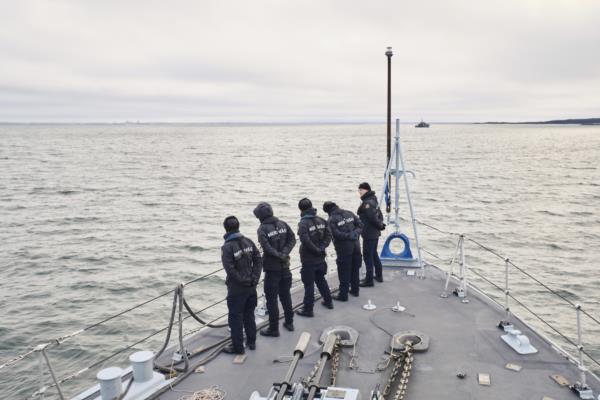
ABOARD THE EML SAKALA IN THE BALTIC SEA (AP) — The Estonian minehunter EML Sakala and its crew are diligently patrolling the Baltic Sea west of Russia, closely monitoring vessels for any suspicious behavior. Equipped with binoculars and cameras, they have approached approximately 200 ships in a week, meticulously documenting details and inspecting for anomalies like missing anchors or trailing cables.
These patrols are part of increased maritime surveillance by NATO countries following the damaging of the Estlink-2 power cable and communication links between Finland and Estonia on December 25. While suspicion initially pointed towards Russia, no concrete evidence has been presented, and the Kremlin has denied any involvement.
The incidents are viewed as a test of Western resolve in the face of suspected sabotage attacks in Europe, believed to be linked to Moscow following its invasion of Ukraine in 2022. The main objective, as emphasized by Lt. Cmdr. Meelis Kants of the Estonian navy, is to demonstrate strength and deter potential threats.













One notable incident involved the seizure of the oil tanker Eagle S by Finnish authorities after it was suspected of damaging power and telecommunication cables by dragging its anchor. The vessel, flagged in the Cook Islands, is believed to be part of Russia's 'shadow fleet' used to circumvent sanctions on oil exports.
The damage to the Estlink-2 cable, crucial for Estonia's winter electricity needs, did not disrupt service but led to increased energy prices in the region. Repairs, estimated to cost millions of dollars, may not be completed until late summer, impacting energy security in the Baltic nations.
The Baltic Sea, crisscrossed by vital undersea cables and pipelines connecting European countries, has witnessed multiple incidents of sabotage since 2023. Ships accused of dragging anchors have been implicated in several cases, raising concerns about the security of critical infrastructure.
Amidst escalating tensions, Western nations are urged to adopt a proactive stance to counter potential threats. The recent imposition of sanctions by the U.S. targeting Russian energy vessels underscores the gravity of the situation.
European leaders have highlighted the need for collective action to safeguard digital and energy infrastructure from deliberate sabotage. The Joint Expeditionary Force, comprising European nations, has pledged closer cooperation to counter Russia's use of shadow ships and enhance maritime security.
As the Baltic Sea remains a strategic hotspot vulnerable to disruptions, naval patrols like the EML Sakala play a crucial role in safeguarding vital infrastructure and deterring hostile activities. The ongoing efforts underscore the importance of unity and vigilance in the face of evolving security challenges.







